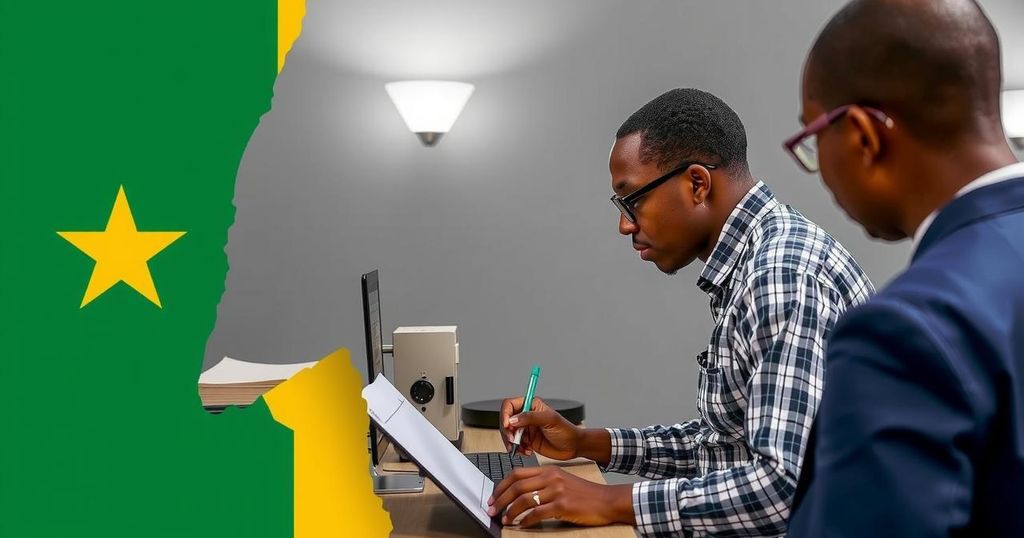World news
AFRICA, ASSOCIATED PRESS, CENTER, DEMOCRACY, ELECTORAL COMMISSION OF NAMIBIA, ELSIE NGHIKEMBUA, FRELIMO, GOVERNANCE, GOVERNMENT, MOZAMBIQUE, NAMIBIA, NANGOMBE SHITALENI, NET, NETUMBO NANDI - NDAITWAH, NORTH AMERICA, OKANDJENGEDI, OPPOSITION, POLITICS, SWAP, SWAPO, UNITED STATES, WINDHOEK
Aisha Khan
0 Comments
Namibia Extends Election Voting Amid Technical Issues, Sparks Opposition Outcry
Namibia has extended voting for presidential and parliamentary elections due to ballot shortages, prompting opposition complaints of possible fraud. Vice President Netumbo Nandi-Ndaitwah seeks to become the nation’s first female president amid growing frustration over economic inequalities, particularly among youth. Despite logistical challenges, electoral officials promise that ballot papers are on the way, although public skepticism remains high.
Namibia’s electoral agency has opted to extend the voting period for the presidential and parliamentary elections into the weekend due to unforeseen logistical complications, including a shortage of ballot papers. Originally scheduled to conclude on Wednesday, polling stations will remain operational until Saturday evening. The extension has drawn criticism from the opposition faction, the Independent Patriots for Change, who allege that this move could facilitate electoral fraud.
Vice President Netumbo Nandi-Ndaitwah, the ruling party SWAPO’s candidate, stands on the precipice of making history as Namibia’s first female leader, pending the election results. This election sees her contend with a frustrated electorate, particularly among the youth, who are disillusioned by economic disparities in a nation endowed with mineral wealth yet grappling with significant inequality.
Elsie Nghikembua, chairperson of the Electoral Commission of Namibia, acknowledged that many citizens encountered difficulties casting their votes due to “logistical” issues. As voters continued to queue for hours, many remote polling stations awaited essential ballot paper deliveries.
Despite assurances from electoral officials that ballots were en route, skepticism pervaded the atmosphere, with many citizens expressing their distress over the process. Nangombe Shitaleni, a frustrated voter, remarked, “I keep coming to the same place every day without being assisted. It’s like you are a mad person.”
Namibia, which gained independence from South African rule in 1990, has long been recognized as one of Africa’s stable democracies. SWAPO has maintained political dominance since independence, yet growing dissatisfaction over viably stagnant economic progression has stoked unrest among young voters, drawing parallels with broader regional trends.
The context of this electoral extension in Namibia reflects deeper issues within the nation’s political landscape. Following its independence from South Africa, Namibia emerged as a beacon of stability in Southern Africa, boasting relatively credible elections. However, the present situation, marked by logistical challenges and the response from a frustrated populace, signals a potential shift in the political dynamics, particularly among younger voters plagued by high unemployment and economic hardship. This backdrop of discontent juxtaposes the ruling SWAPO party’s historical dominance and ongoing frustration within the electorate.
In summary, Namibia’s decision to extend the voting period due to logistical issues has ignited significant controversy, particularly from the opposition, who suspect foul play. As the nation approaches this pivotal election, socio-economic frustrations among the youth, combined with historical sentiments toward the ruling party, may herald a crucial turning point in Namibia’s political future. The outcome of this electoral process will undoubtedly shape the nation’s democratic landscape for years to come.
Original Source: abcnews.go.com




Post Comment